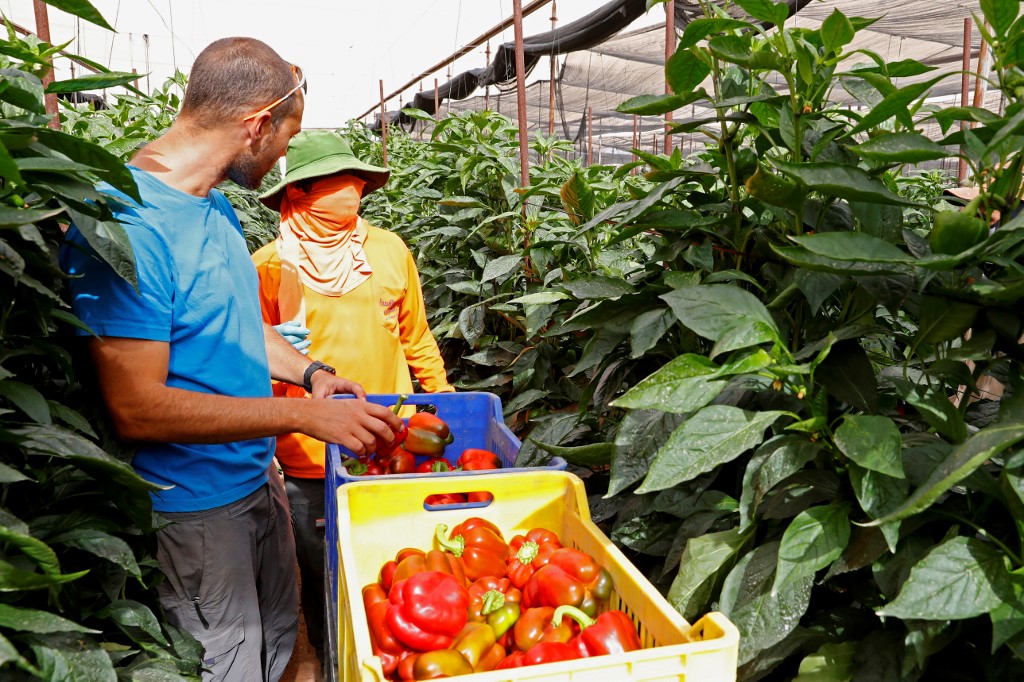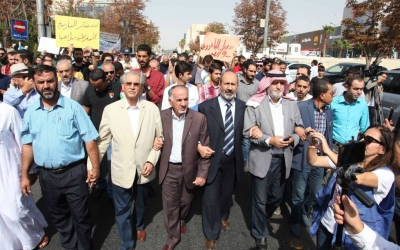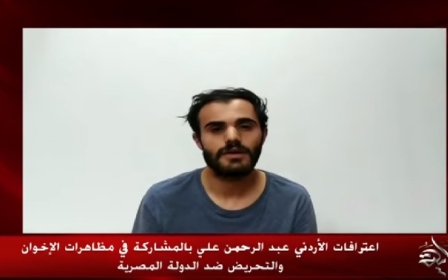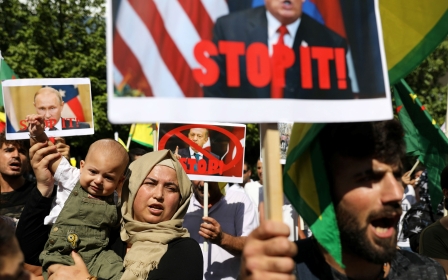Jordanians anxious for return of lands leased to Israel
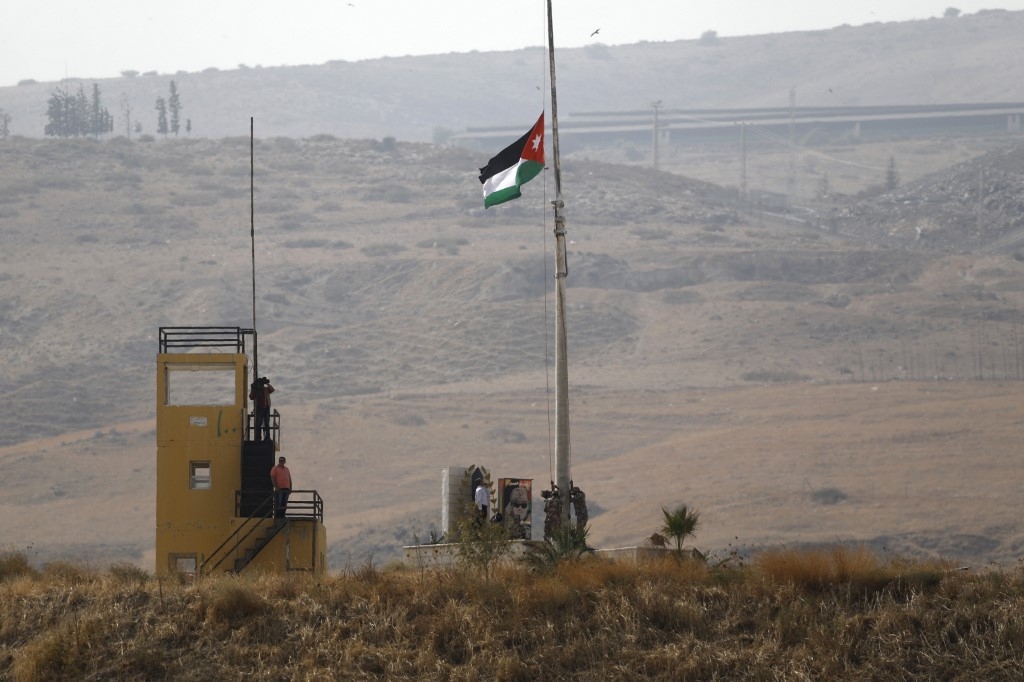
Jordanians are cautiously awaiting the return of two enclaves, leased to Israel for the past 25 years, scheduled to come back into Amman’s possession next month.
Baqoura and al-Ghamra were rented to Israel as part of the 1994 Israel-Jordan peace agreement, which allowed either party to opt out of renewing the agreement.
'We had discussions about how to end things, but not regarding a renewal'
- Sufyan al-Qudah, Jordanian Foreign Ministry
A year ago, following pressure from protesters and parliamentarians, that’s exactly what Jordanian King Abdullah II told Israel, starting the clock on the return of the territories that have been used for farming and tourism. They are scheduled to be transferred back under Jordanian control early next month.
However, Jordanians have been shaken to read Israeli media reports over the past week saying that Israeli is negotiating an extension of the agreement. Or that King Abdullah II has already agreed to extend the lease so Israeli farmers can enjoy one more growing season.
Jordanian government officials have firmly denied the accounts in the Israeli media. Foreign ministry spokesman Sufyan al-Qudah told Middle East Eye that the kingdom’s decision, taken last October, to end the rental agreement is “is final and, accordingly, these annexes will expire November 10th 2019 in accordance to the peace agreement. No extension or renewal will occur.”
New MEE newsletter: Jerusalem Dispatch
Sign up to get the latest insights and analysis on Israel-Palestine, alongside Turkey Unpacked and other MEE newsletters
But not everyone has been satisfied by these assurances.
“Our government could not resolve the teacher’s strike in the proper way,” said Rula Hroub, a former MP and head of the Al-Urdun al-Aqwa party. “How will it face up to a much bigger problem of returning lands from Israel?”
As officials continue to underline that the decision is final, MEE understands from an Israeli source that while the lands will officially come back to Jordan soon, talks continue about potential Israeli access to the enclaves moving forward.
“Obviously, there is a definite need for them to deny this,” said the source, who has been in direct contact with Israeli negotiators. “It is not about preventing the restoration of sovereignty, but about the arrangement of access for Israelis and mainly the farmers after the lands return.”
Rich agricultural land
Israel seized Baqoura – known in Hebrew as Naharayim - in the north of Jordan in 1950 and then took al-Ghamra, called Tzofar in Hebrew, in the south in 1967.
The Baqoura area is 6,000 dunams. Jordan regained 850 dunams of the enclave in 1994 as part of its peace agreement with Israel. These days, it is an area that attracts tourists to the Island of Peace, an area where the Yarmouk and Jordan rivers meet.
The al-Ghamra area, which is 4,000 dunams near the Dead Sea Road, is a rich agricultural area with plentiful deep-water wells where farmers grow peppers, among other produce.
Under the 1994 peace agreement which has a special protocol for the management of the areas, the land rental was set for 25 years, and would be renewed automatically for further 25-year periods unless either side informed the other that it wanted to end the rental up until a year before the initial 25 years was set to expire.
Last October, the Jordanians told the Israelis they would not renew, and that’s still where things stand, the foreign ministry's al-Qudah told MEE this week.
Responding to the Israeli media reports about alleged negotiations between Jordan and Israel, al-Qudah said: “The Israeli side asked for consultation, in accordance to what the peace treaty calls for. We had discussions about how to end things, but not regarding a renewal. The discussions focused on how to change from the previous period to the future one.”
Jordanian government spokesperson Jumana Ghunaimat also denied the Israeli reports. “What is being published about the renewal of the rental of the Baqoura and al-Ghamra lands is not true,” she said.
But despite the clear denials, some voices in Jordan are concerned about the issue. Hroub, the former MP and Al-Urdun al-Aqwa party leader, is pessimistic about Jordan’s ability to relinquish the lands.
“We have a weak government and a helpless parliament. Arabs and the international community have left us alone to face a pro-Israel US administration. That is why I believe that our government is unable to return the lands of Baqoura and al-Ghamra,” she said.
Some MPs have used doubts and questions around the lands to pressure the government. Last month, MP Saleh Armouti directed a parliamentary question to Prime Minister Omar Razzaz, asking the government to outline the steps it planned to take to see the return of Baqoura and al-Ghamra.
Armouti told MEE he feels satisfied by the government’s response. “The answer of Foreign Minister Ayman Safadi to my question was official and clear. He said that they have informed the occupiers that the work of the special land annex has ended and that they are obliged to return the lands on November 10th and that we are waiting to receive those lands.”
Pressure continues
Jordan faces a problem with private owners of some of the land in question. In 1926, the British Mandate authority gave the Palestinian Electric Company owner Pinhas Rutenberg, one of the leaders of the Zionist movement, concession rights to generate electricity using the Jordan and Yarmouk rivers in Baqoura.
In 1928, the executive council of the East Jordan government approved the concession, which had a 70-year term. Later, Rutenberg sold his land to the Jewish Agency, the premier organisation promoting Jewish immigration to Israel and Palestine.
'These ownerships are illegal because they were passed to the Jewish Agency'
- Jordanian MP Dima Tahboub
Amman MP Dima Tahboub considers this sale “illegal”.
“The previous Jordanian government of [prime minister] Hani Mulki has spoken about the need to respect private property in Baqoura and al-Ghamra. But these ownerships are illegal because they were passed to the Jewish Agency. The Jordanian government should seek full sovereignty over these lands.”
Jordan University constitutional law professor Laith Nasrawin told MEE that “if Israel insists on not returning these lands, both sides can apply for international arbitration which is a mechanism that exists in the peace treaty between both sides”.
Jordanian activists, MPs and political party members plan to hold a forum next Tuesday in Amman to review the situation and plan any further steps to ensure the return of the lands.
Organisers told MEE they want to use the forum to pressure their government to stick to its current position.
Middle East Eye delivers independent and unrivalled coverage and analysis of the Middle East, North Africa and beyond. To learn more about republishing this content and the associated fees, please fill out this form. More about MEE can be found here.


